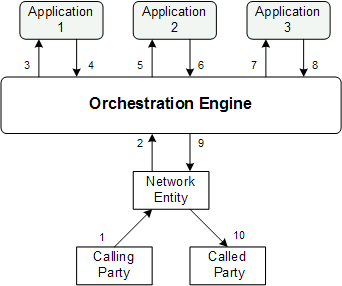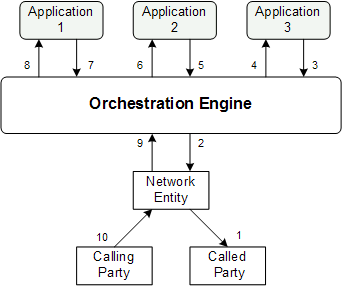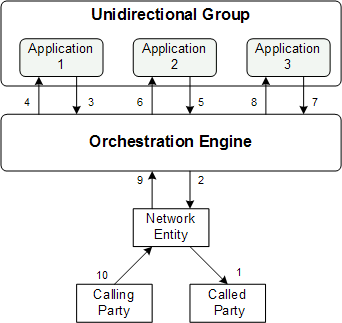4 Defining the Orchestration Order of Messages Sent by a Called Party
This chapter describes how to define the order of messages sent by a called party for Oracle Communications Service Controller.
About the Orchestration Order
Orchestration logic defines how the OE routes messages generated by the calling party. For example, you can set an initial INVITE to be routed from Application 1 to Application 2 to Application 3. Figure 4-1 shows the order in which the OE routes an INVITE message from a calling party to a called party.
Orchestration logic does not specify how the OE routes messages received from a called party. By default, when a called party generates a message (for example, an OK response to an INVITE message), the OE routes this message in the reverse order, from Application 3 to Application 2 to Application 1. Figure 4-2 shows the order in which the OE routes an OK response from a called party to a calling party.
When an application in the orchestration chain depends on the information generated by a previous application, you might need to route all messages, including those generated by a calling party and those generated by a called party, in the same order. For example, you might need a message to be first routed to an online charging application and then to a bill shock application. In this case, a bill shock application can perform certain actions based on the information generated by the online charging application.
To allow the OE to route all messages across applications in the same order, you need to group these applications in a unidirectional group. Figure 4-3 shows how the OE routes a message generated by a called party through applications in a unidirectional group.
When grouping applications into unidirectional groups, you must observe the following limitations:
-
You can group only those applications that run consecutively. For example, on Figure 4-3, you can group Application 1 and Application 2. However, you cannot group Application 1 and Application 3 because they do not run consecutively.
-
Each application in a unidirectional group must be implemented as a Back-to-Back (B2B) application.
Note:
Service Controller does not support unidirectional groups when the Diameter-based orchestration mode is enabled. For more information on the Diameter-based orchestration mode, see the discussion on improving performance in Diameter-only environments in Service Broker Online Mediation Controller Implementation Guide Release 6.1.

